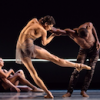There is a simple but powerful moment in Alonzo King LINES Ballet’s “Deep River,” which the company performed at Blue Shield of California Theater at YBCA this weekend. The moment, labeled simply “Transition” in the program, is a single crossover from stage left to right for Adji Cissoko and Shuaib Elhassan, who return with a more elaborate pas de deux later in the program.
King’s 2022 work fuses Black spirituals and Jewish liturgical music through the evocative sound world of Jason Moran and Lisa Fischer. “Transition” follows the opening “Kaddisch” for the full company, where we are greeted with an array of chiseled, articulate bodies in full, expressive sequences of highly choreographed dance movement. In “Kaddisch,” the stage is bustling with action. Each dancer moves through complicated sequences, angular shapes, and changes of direction with ease and urgency. They are fully present and tuned into one another. After a full-bodied exaltation of a dance, most exit the stage, leaving just the duo — and amidst the intensity of Friday evening’s performance, it was this moment that shook me most.
The most stripped-down description of the duet goes something like this: Elhassan carries the limp body of Cissoko tenderly across the stage. End scene.
But to convey what truly unfolds: Elhassan, stolid and steady, cradles Cissoko tenderly in his arms as he crosses toward center. At first glance, it seems she is nuzzled in close, encircled in a tender embrace, with her head against his shoulder and her legs draped over his strong arm.
It’s a familiar scene — hearty male carries seemingly helpless female to an unknown destination. But, as we watch, the scene shifts dramatically. Elhassan’s movements, while remaining strong, start to reveal a subtle struggle. The steps are uneven, ever so slightly hesitant. Cissoko’s body starts to slacken, slipping from what appeared at first a warm embrace, and the audience, paying rapt attention, comes to realize that her body is simulating lifelessness with shocking verisimilitude.
Midway across the stage, Elhassan has to pause and lower Cissoko’s body toward the ground in order to readjust his hold on her. He gingerly sets her on the floor, rearranging her limbs as they tumble akimbo. Cissoko’s ability to release her limbs, and for her head to loll back just so, is a deceptively difficult thing to do, requiring exquisite skill. Elhassan’s grief is understated, with not a hint of histrionics. It is, it seems, an act of overcoming more than of being overwhelmed. This self-control allows the audience to take an emotional journey, only gradually realizing the gravity of what we are witnessing. Elhassan eventually organizes Cissoko’s body back into position and rises. He continues across the stage with dignity, and they exit.
What stays with me most is this: “Transition” is not necessarily about war. But, given the times we live in — heavily laden as they are with daily news of bombings, invasions, destruction and starvation — it became, for me, a prayer for a war-torn world. In Cissoko’s body, gathered tenderly and mourned over stoically, I felt the heaviness of the thousands who have died in Ukraine, in Palestine, in Sudan, in Myanmar. In Elhassan’s care, strength, and attentiveness, I saw the survivors forced to endure life after a loved one has died tragically and unnecessarily. The seemingly simple action of crossing the stage held a world of grief and pain, of deep love and responsibility, of senseless loss that we are all, on some level, currently maneuvering through. We bore witness, together. It was a breathtaking reminder of the fragility of our mortality, and of our ability to carry on to the other side of our grief, no matter how long the journey.




